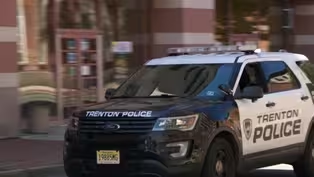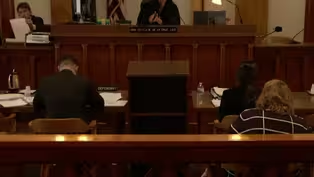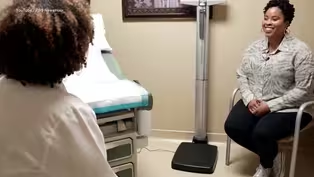NJ Spotlight News
What to know as ‘walking pneumonia’ spreads
Clip: 11/21/2024 | 5m 19sVideo has Closed Captions
Interview: Epidemiologist Stephanie Silvera, Montclair State University
“Walking pneumonia,” a mild form of the lung infection, is spiking across New Jersey, especially among children. And with the holidays coming, there are concerns about the rising number of cases and that many people may have the illness and not realize it. Often mistaken for a cold or the flu, the respiratory illness is treatable with antibiotics.
Problems playing video? | Closed Captioning Feedback
Problems playing video? | Closed Captioning Feedback
NJ Spotlight News is a local public television program presented by THIRTEEN PBS
NJ Spotlight News
What to know as ‘walking pneumonia’ spreads
Clip: 11/21/2024 | 5m 19sVideo has Closed Captions
“Walking pneumonia,” a mild form of the lung infection, is spiking across New Jersey, especially among children. And with the holidays coming, there are concerns about the rising number of cases and that many people may have the illness and not realize it. Often mistaken for a cold or the flu, the respiratory illness is treatable with antibiotics.
Problems playing video? | Closed Captioning Feedback
How to Watch NJ Spotlight News
NJ Spotlight News is available to stream on pbs.org and the free PBS App, available on iPhone, Apple TV, Android TV, Android smartphones, Amazon Fire TV, Amazon Fire Tablet, Roku, Samsung Smart TV, and Vizio.
Providing Support for PBS.org
Learn Moreabout PBS online sponsorshipWalking pneumonia or a mild form of the lung infection is spiking across new Jersey, especially among children.
And with the holidays coming, there are concern about the rising number of cases and that many people may have the illness and not realize it.
Often mistaken for a cold or the flu.
The respiratory illness is treatable with antibiotics.
New Jersey hospitals have seen an uptick in emergency room visits and admissions, mirroring a national trend.
Montclair State University professor and epidemiologist Stephanie Silvera’s own daughter was diagnosed just last week.
So to discuss more on her own experience and what symptoms to look out for to keep your family and friends safe, she joins me now.
Stephanie, thank you for joining me.
All right.
Thank you.
Now, I know you know firsthand about the dangers of walking pneumonia after your daughter was diagnosed with it last week.
First, how is she doing?
It's in recovery.
Did their round of antibiotics, seems to be on the mend.
Unfortunately, like many people, that cough is lingering.
All right, so let's walk us through some of the symptoms that often go missed because it can be confusing.
From what I understand, with the common cold or flu.
Yeah.
So the symptoms are essentially almost identical.
You're talking about a cough potentially a fever, runny nose.
Often some some sore throat and chest pain.
Those are often because of the amount of coughing.
For most people, it presents as the common cold.
They're out there living their lives.
That's why they call it walking pneumonia.
And it really isn't until, you know, one, if people have access to medical care that they go in, to get an official diagnosis or to get tested, or if it progresses to a more severe illness, often in people who have preexisting conditions, like, asthma, for example, that it really gets diagnosed and then potentially treated.
So, Stephanie, we know that it is treatable, but it can also become dangerous.
So how do we treat walking pneumonia and really prevent it from becoming dangerous?
So, you know, most of walking and walking pneumonia is caused by a bacteria.
And so most antibiotic are going to work.
And we have some very effective ones that do work.
That's the best way of preventing it from getting worse.
The other key is if your child and this is typically amongst children right now, is showing signs of respiratory distress.
If the cough is, worsening in any way and you do have access to healthcare, then you will want to see your physician to ideally get that diagnosed and get on the treatment.
Unfortunately, what we're also seeing right now is that children who are living closer to poverty, poorer children and people without access to health care are the ones who are suffering the most because they don't have access to a physician or to prescription medication.
Can it become deadly?
Yes.
So in about 5 to 7% of cases, you can require hospitalization.
That usually is a pretty small number.
Unfortunately, as cases go up, the number of those cases will also go up proportionally.
And so we want to be really mindful about how do we sort of stem the tide of the spread.
And I know nobody's going to want to hear this, but it's a respiratory illness.
And so what we know works for other respiratory illness.
Staying home if you can, wearing a mask, if you have to go out is really the best way to prevent this get spread to other people who are more immunocompromised.
And Stephanie, we know this is a national trend, but here in new Jersey, there are reports from emergency rooms that are seeing a rise in cases.
How bad is it and why is it impacting a large number of children?
So, you know, nationally we've seen the hospitalizations and the rates go up from about 1% for children who are 2 to 4 to as high as about 7%.
Right.
And we've seen approximately a doubling in children who are age 5 to 17.
You know, one of the reasons we see this most commonly in children is because children are in congregate settings, such as schools.
And they are coming in contact with a lot of other people.
The windows are closed at this time of year.
The weather's not good.
And so they're spreading it to one another.
And again, most of the time you don't feel badly enough with these kids need to necessarily stay home.
They're not having a fever necessarily.
And so we're sending them to school and they're spreading it.
The danger for them also becomes that they're not coming back home to families that might be multi-generational, or might have somebody who is at higher risk for more severe illness.
And so, you know, we really need to think about preventing the spread using the tools that we know work.
Stephanie Silvera always great advice, especially as we head into the holiday season.
Thank you so much for joining me.
Thank you for having me.
DOJ finds pattern of misconduct by Trenton police
Video has Closed Captions
Clip: 11/21/2024 | 1m 15s | Results of yearlong investigation were released Thursday (1m 15s)
End mandatory minimum sentences in nonviolent drug cases?
Video has Closed Captions
Clip: 11/21/2024 | 4m 59s | NJ commission also recommends other sentencing reforms (4m 59s)
Murphy delivers keynote at League of Municipalities
Video has Closed Captions
Clip: 11/21/2024 | 1m 34s | The governor's speech focused on economic growth and affordability (1m 34s)
NJ mandates postpartum care plans for all pregnancies
Video has Closed Captions
Clip: 11/21/2024 | 5m 2s | Maternal health providers must make postpartum plan early in pregnancy (5m 2s)
World Cup's challenges and opportunities for NJ
Video has Closed Captions
Clip: 11/21/2024 | 4m 56s | State's first men's World Cup since 1994 expected to bring in big tourism (4m 56s)
Providing Support for PBS.org
Learn Moreabout PBS online sponsorship
- News and Public Affairs

Top journalists deliver compelling original analysis of the hour's headlines.

- News and Public Affairs

FRONTLINE is investigative journalism that questions, explains and changes our world.












Support for PBS provided by:
NJ Spotlight News is a local public television program presented by THIRTEEN PBS




